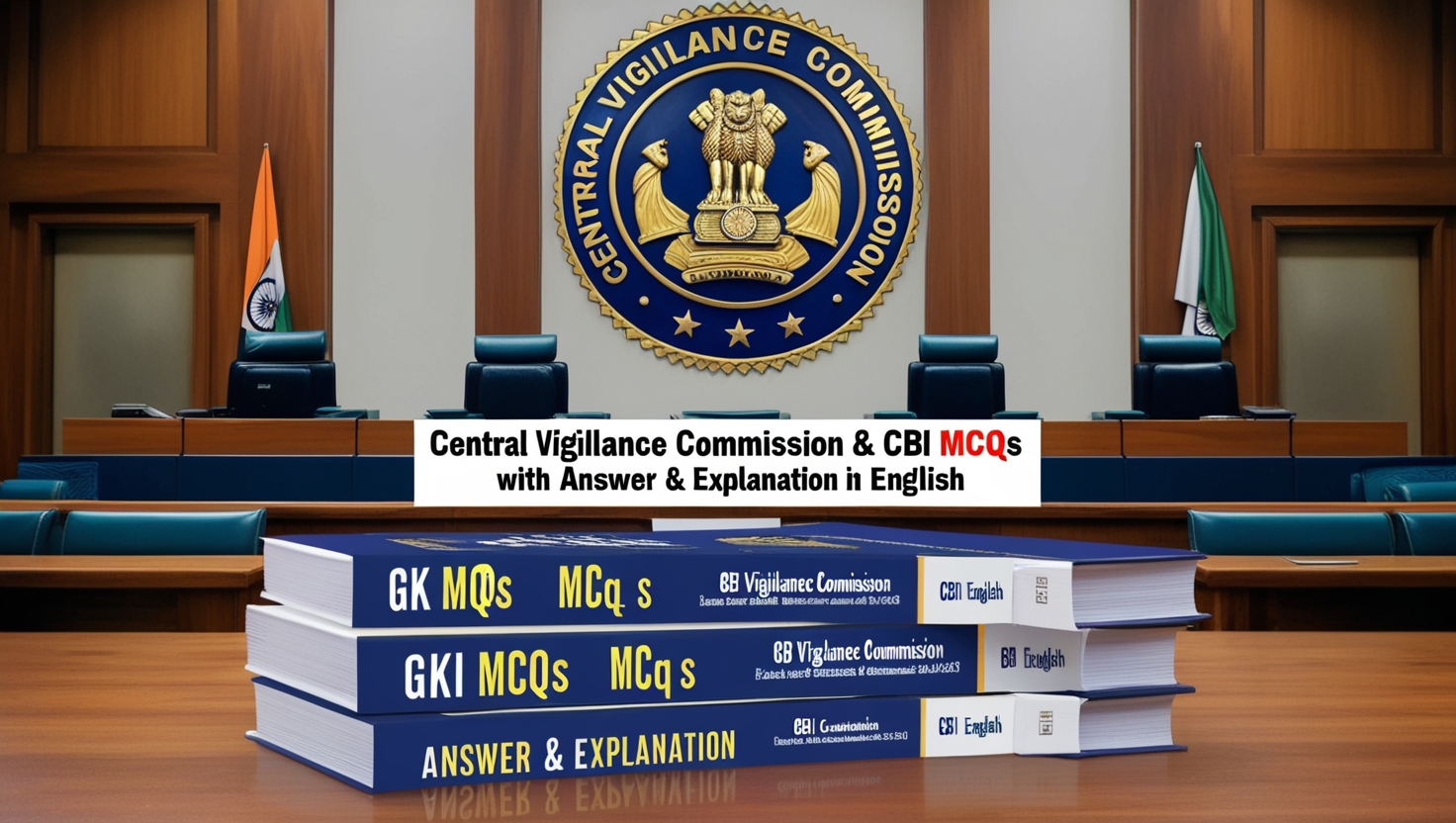
The article titled Central Vigilance Commission & CBI GK MCQs With Answer & Explanation in English provides a comprehensive set of multiple-choice questions (MCQs) designed to test and enhance your knowledge of India’s Central Vigilance Commission (CVC) and the Central Bureau of Investigation (CBI).
Along with detailed explanations for each answer, this article aims to help students and aspirants gain a clear understanding of the roles, functions, and importance of these key anti-corruption bodies in India. Perfect for exam preparation and general awareness.
1. When was the Central Vigilance Commission (CVC) established?
- 1962
- 1963
- 1964
- 1965
Show Answer
Answer: 1964
The Central Vigilance Commission (CVC) was established in 1964 based on the recommendations of the Santhanam Committee on Prevention of Corruption, which conducted its work from 1962 to 1964. The CVC was set up to address corruption-related issues within the Indian government.
2. In which year was the Central Vigilance Commission (CVC) given statutory status?
- 2001
- 2003
- 2006
- 2008
Show Answer
Answer: 2003
The CVC was given statutory status in 2003 through the Central Vigilance Commission Act, which was enacted by the Indian Parliament. This statutory status strengthened its authority and functions.
3. What is the maximum number of members, including the chairman, that the CVC can consist of?
- 2
- 3
- 4
- 5
Show Answer
Answer: 2 Members
The Central Vigilance Commission is a multi-member body that typically consists of a Central Vigilance Commissioner (chairperson) and not more than two Vigilance Commissioners. The members play a crucial role in overseeing vigilance and anti-corruption efforts within the government.
4. Who appoints the Central Vigilance Commissioner?
- President
- Parliament
- Supreme Court
- Prime Minister
Show Answer
Answer: President
The President of India appoints the Central Vigilance Commissioner on the recommendation of a three-member committee. The committee is chaired by the Prime Minister and also includes the Home Minister and the Leader of the Opposition in the Lok Sabha (Lower House of Parliament).
5. What is the maximum term of the Central Vigilance Commissioner and other Vigilance Commissioners?
- 2 years
- 3 years
- 4 years
- 5 years
Show Answer
Answer: 4 years
The Central Vigilance Commissioner and other Vigilance Commissioners hold office for a term of four years or until they attain the age of sixty-five years, whichever is earlier. This term is designed to ensure their independence and continuity in the role.
6. Who is empowered to remove the Central Vigilance Commissioner?
- Parliament
- Rajya Sabha
- President
- Prime Minister
Show Answer
Answer: President
The President of India has the authority to remove the Central Vigilance Commissioner or any Vigilance Commissioner from office on specified grounds, which include misbehavior or incapacity.
7. What are the functions of Chief Technical Examiners’ Organisation, the technical wing of CVC?
- Technical audit of construction works of Government organisations from a vigilance angle.
- Investigation of specific cases of complaints relating to construction works.
- Both 1 and 2
- None of the above
Show Answer
Answer: Both 1 and 2
The Chief Technical Examiners’ Organisation (CTEO) is a part of the CVC and is responsible for technical audits of construction works carried out by government organizations from a vigilance perspective. It also investigates specific cases related to construction projects.
8. The Director of Prosecution under the Directorate of Prosecution in CBI is appointed by the recommendation of which of the following?
- President
- Central Vigilance Commission
- Chief Justice of India
- Parliament
Show Answer
Answer: Central Vigilance Commission
The Director of Prosecution under the Directorate of Prosecution in the Central Bureau of Investigation (CBI) is appointed by the Central Government on the recommendation of the Central Vigilance Commission. This role is crucial in overseeing prosecution in corruption cases.
9. The jurisdiction of the CVC extends to which of the following?
- Members of All India Services.
- Officers of the rank of Scale V and above in the Public Sector Banks.
- Officers in Grade D and above in Reserve Bank of India, NABARD, and SIDBI.
- All 1, 2, 3
Show Answer
Answer: All 1, 2, 3
The jurisdiction of the CVC extends to various categories, including Members of All India Services, officers of a certain rank in public sector banks, and officers in Grade D and above in entities like the Reserve Bank of India, NABARD, and SIDBI.
10. Which body reviews the progress of investigations conducted by the Delhi Special Police Establishment into offences alleged to have been committed under the Prevention of Corruption Act, 1988?
- Central Vigilance Commission
- Central Bureau of Investigation
- Lokpal
- High Court
Show Answer
Answer: Central Vigilance Commission
The Central Vigilance Commission reviews the progress of investigations conducted by the Delhi Special Police Establishment (DSPE), commonly known as the CBI, into offenses alleged to have been committed under the Prevention of Corruption Act, 1988. The DSPE operates under the jurisdiction of the CVC in such cases.








Leave a Reply